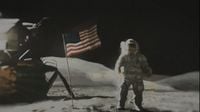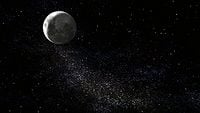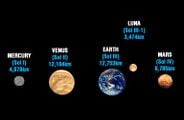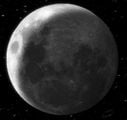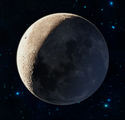Luna: Difference between revisions
From Halopedia, the Halo wiki
No edit summary |
(→Trivia) |
||
| Line 109: | Line 109: | ||
==Trivia== | ==Trivia== | ||
*Luna is the [[Latin]] word for Moon, and many Latin-based languages share the word. | *Luna is the [[Latin]] word for Moon, and many Latin-based languages share the word. | ||
*In many Earth-based maps in the ''Halo'' games, | *In many Earth-based maps in the ''Halo'' games, Luna often appears to be larger than in real life. | ||
==Gallery== | ==Gallery== | ||
Revision as of 08:43, July 29, 2023
| There is more information available on this subject at Luna on the English Wikipedia. |
| Luna | |
|---|---|
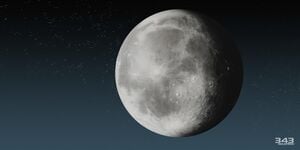
| |
| Astrographical | |
|
System: |
|
|
Orbiting: |
|
| Societal | |
|
Species: |
|
|
Colonized: |
|
|
Government: |
|
Luna, often referred to as the Moon, is the only natural satellite of Earth.[1] Luna is home to a large human population and the renowned Luna OCS Academy.[4] Luna houses a number of skyhook defense complexes suspended in its low orbit.[5]
Luna is also the name generally used to refer to the populated colonies across the moon.[6][7]
Overview
Topography
Luna has a barren surface and is atmospherically devoid. Its gravity is low, which has prevented large-scale terraforming.[8][9] Day and night run in a month-long pattern of two weeks of darkness and two weeks of light.[7]
Luna has a "near side"/"front face" and a "far side". The far side of Luna faces out into space while the near side faces Earth. The far side contains more and deeper impact craters than the near side since the near side is protected by Earth itself. Daedalus Crater was in the middle of the far side while Mare Cognitum is on the near side and visible from Earth without a telescope.[7]
Due to being atmospherically devoid, the habitats on Luna are sealed from the vacuum and interconnected by tubes.[10] Most contain soaring spires dotted with windows (all designed to take advantage of the low gravity) and vast dome habitats.[7] Colonies on the moon are sometimes referred to as canopy settlements.[11]
Locations
- Naniwa
- Daedalus Crater
- Delambre
- Lake Autolycus
- Mare Cognitum
- Mare Nubium
- Mare Insularum
- Mare Imbrium
- Mare Frigoris
- Procellarum basin
- Tycho Observation Facility[12]
- UNSC Transit Dock L22[13]
- UNSC Naval Archives
Known residents
History
Rise of humanity
Human beings took their first steps on Luna in 1969.[14] By 1971, US Apollo 14 astronaut Edgar Dean Mitchell was the 6th human to have walked on the moon.[15]
Humans began settling on Luna around 2080.[2][3] During the Interplanetary War, Vladimir Koslov and his family were killed in a bombing at Lake Autolycus on Luna.[11]
The Colonial Administration Authority had the Odyssey along with hundreds of Phoenix-class colony ships and Euphrates-class colony ships made over Luna.[16] The Domus Diaspora was launched from Luna[17] in 2362.
By 2492, a governing body of Luna was known as Luna Confederated States, the State of Mare Nubium being one of the said states. The Academy at Mare Nubium, known more generally as the Luna OCS Academy, was located here.[18]
Human-Covenant war
- Main article: Human-Covenant war
Despite its proximity to Earth, Luna was home to some degree of Insurrectionist activity; shortly after 2530, the parents of Michael Crespo died attempting to detonate a bomb attached to a government building on Luna.[20]
Around the time of the Fall of Reach, flights from the Manassas Spaceport on Reach went to Luna.[19]
During the Battle of Earth in late 2552, both Luna and Mars got hit particularly hard compared to other colonies in the Sol system, although they both fared better than Earth.[21] Around November 17, an overwhelming and final Covenant naval forces under the command of the Prophet of Truth break through the Lunar perimeter and later overrun too much of the weakened Home Fleet over Earth as the Truth-controlled Forerunner Dreadnought headed for the planet, letting the Covenant fleet to lead a subsequent bombardment on the human homeworld.[22][23]
Many habitats on the moon survived the Covenant assault relatively intact.[24] Following the Battle for Tribute with the loss of over half of the population on Tribute, Earth was unable to afford to spare any immediate assistance with Sol’s colonies left in ruins.[25]

Post-war
Following the Human-Covenant War, Luna was home to the Office of Naval Intelligence vessel UNSC Rubicon, which was deployed to Installation 00 in December of 2553 to investigate the disappearance of automated probes sent eight months prior and to determine the source of an unknown signal.[26][27]
Created uprising
- Main article: Created uprising
Luna lost power during The Reclamation. Two days later, one of the facilities on the moon was overrun by Armigers who took hostages. Shortly after, Alpha-Nine arrived on a mission in order to retrieve Vergil.[28]
Government and society
Due to the physical limitations of the moon, gravity and atmospherics have to be provided by large scale system and massive housing infrastructure. Luna features some of the most densely populated places in the galaxy with Mare Cognitum being the largest.[7]
The Office of Naval Intelligence maintained a base on Luna in the Daedalus Crater.[7]
Trivia
- Luna is the Latin word for Moon, and many Latin-based languages share the word.
- In many Earth-based maps in the Halo games, Luna often appears to be larger than in real life.
Gallery

|
Browse more images in this article's gallery page. |
Luna shortly before the Battle of Earth.
Luna, with Oaxaca Station in the foreground.
Concept art of Luna in orbit of Earth in Halo: Spartan Strike.
List of appearances
- Halo: The Fall of Reach (First mentioned)
- Halo 2 (First appearance)
- Halo 3
- Halo: The Cole Protocol
- Halo: Evolutions - Essential Tales of the Halo Universe
- Remember Reach
- Spaceport (Mentioned only)
- Halo: Cryptum
- Halo: Combat Evolved Anniversary
- The Commissioning
- Halo 4
- Halo: Escalation
- Halo 2: Anniversary
- Halo: New Blood (Mentioned only)
- Halo: Spartan Strike
- Halo: Hunters in the Dark (Mentioned only)
- Halo Mythos
- Halo: Envoy (Mentioned only)
- Halo: Retribution (Mentioned only)
- Halo: Legacy of Onyx (Mentioned only)
- Halo: Bad Blood
- Halo: Outpost Discovery (Mentioned only)
- Halo Infinite
Sources
- ^ a b c Halo Waypoint, Universe - Earth (Retrieved on Jun 1, 2020) [archive]
- ^ a b c Halo Encyclopedia (2009 edition), page 44
- ^ a b c Halo Mythos - Rise of Humanity, page 47
- ^ Halo: The Cole Protocol, p. 34
- ^ Halo Waypoint: Halo 4 Interactive Guide
- ^ Halo: Bad Blood, chapter 5
- ^ a b c d e f Halo: Bad Blood, chapter 6
- ^ Halo Encyclopedia (2009 edition) - The Sol System, page 282-283
- ^ Halo Encyclopedia (2011 edition) - The Sol System, page 294-295
- ^ Halo: Evolutions, "The Impossible Life and the Possible Death of Preston J. Cole"
- ^ a b Halo Mythos - Rise of Humanity, chapter 50-51
- ^ Halo Legendary Crate, Data Drop #2
- ^ Halo: Outpost Discovery, Gabriella terminal, UNSC Form 4026-N
- ^ Halo Encyclopedia (2009 edition) - Timeline, page 31
- ^ Society of the Ancients, Members (Retrieved on Nov 22, 2007) [archive]
- ^ Halo Encyclopedia (2022 edition), page 116
- ^ Halo Encyclopedia (2022 edition), page 40
- ^ Halo: Evolutions, "The Impossible Life and the Possible Death of Preston J. Cole", p. 433
- ^ a b Halo: Reach, Spaceport
- ^ Halo 3: ODST Pre-mission Evaluation - Mickey Interview
- ^ Halo: New Blood, chapter 12
- ^ Halo 2, campaign level The Great Journey
- ^ Halo 3, campaign level Crow's Nest
- ^ Halo Waypoint, Humans (Retrieved on Jun 1, 2020) [archive]
- ^ Halo Waypoint, Tribute (Retrieved on Jun 1, 2020) [archive]
- ^ Halo: Hunters in the Dark, chapter 2
- ^ Eleventh Hour reports, Provenance
- ^ Halo: Bad Blood, chapter 5-7
| ||||||||
